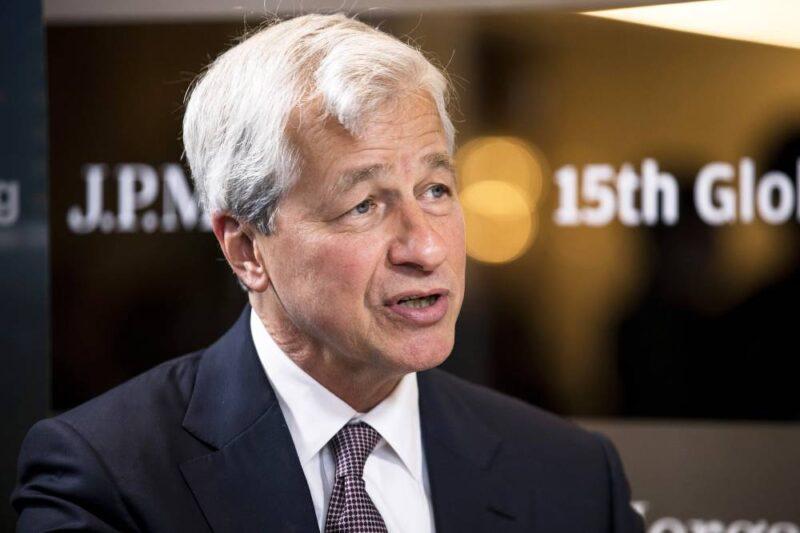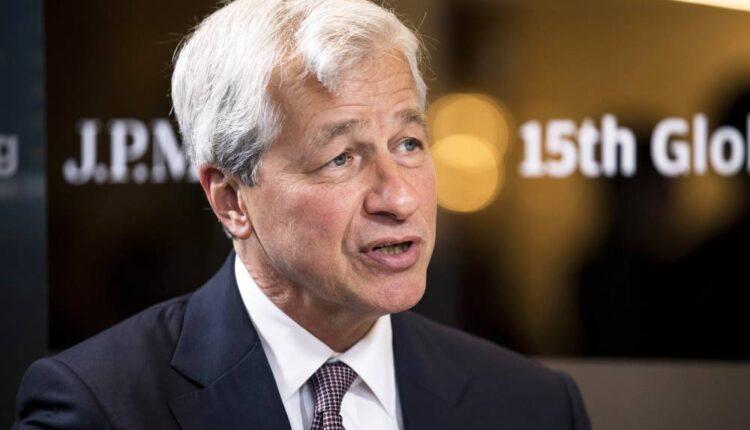
- JPMorgan Chase chief Jamie Dimon said he expects the coronavirus crisis to include a "bad recession" and elements of financial strain similar to the 2008 downturn.
- In his annual shareholders letter, Dimon also warned that the bank may have to consider suspending its dividend if the economy reaches "extremely adverse" conditions.
- As the economy worsens and loan losses mount, regulations put in place after the last crisis a decade ago would begin to constrain the bank, Dimon warned.
- He added that while JPMorgan "will participate in government programs to address the severe economic challenges, we will not request any regulatory relief for ourselves."
VIDEO1:1701:17JPMorgan Chase CEO Jamie Dimon discusses coronavirus response in annual letterSquawk Box
JPMorgan Chase chief Jamie Dimon said Monday he expects the coronavirus crisis to include a "bad recession" and elements of financial strain similar to the 2008 downturn.
The chairman and CEO of the biggest U.S. bank said that while JPMorgan entered the crisis from a position of strength and that lenders have prepared for this, the pandemic is playing out in ways that are "dramatically different" from the industry's Federal Reserve stress tests.
"We don't know exactly what the future will hold — but at a minimum, we assume that it will include a bad recession combined with some kind of financial stress similar to the global financial crisis of 2008," Dimon said in his annual shareholders letter. "Our bank cannot be immune to the effects of this kind of stress."
Dimon, 64, has returned to JPMorgan after a heart procedure last month to find an industry at a critical juncture. After being responsible for the excesses that led to the last crisis in 2008, banks are now being called upon to help support millions of people and businesses.
While the lender is fresh off a record year for revenue and profit, Dimon said that the bank's earnings "will be down meaningfully in 2020" because of the coronavirus. He also warned that in an "extremely adverse" downturn in the U.S. economy, JPMorgan would probably consider suspending its dividend to preserve capital.
That message is likely to reverberate among bank investors and analysts. Executives have said that while the biggest U.S. banks voluntarily pulled back on share repurchases at the onset of the crisis, their dividends were safe. Now, with the leader of the world's most valuable bank by market capitalization broaching the topic of a dividend cut, it would seem that most banks could also be vulnerable if the economy doesn't recover later this year.
JPMorgan has steadily raised its dividend in recent years, reaching a quarterly payout of 90 cents a share.
Call centers overwhelmed
As the coronavirus pandemic has gripped the U.S., JPMorgan has managed to keep about 4,000 branches open and the "vast majority" of ATMs stocked with cash, Dimon said.
But there were still signs of strain: Call centers "have not fared as well" because many of them have been shuttered by local governments, leading to longer wait times, he said.
Dimon also summarized JPMorgan's efforts to support individuals, businesses and corporations. The bank is giving a 90 day grace period for mortgage and auto loan borrowers and waiving late fees on credit cards, he said. Big clients have pulled $50 billion from revolving lines of credit and tapped another $25 billion in new credit last month.
The bank's 2020 submission to the annual Fed stress tests indicate that even in an "extremely adverse scenario," it can lend out an additional $150 billion for clients, Dimon said. The New York-based bank had $500 billion in total liquid assets and $300 billion in borrowing ability from Fed sources, he added.
But as the economy worsens and loan losses mount, regulations put in place after the last crisis a decade ago will begin to constrain the bank, Dimon warned.
"As we get closer to the extremely adverse scenario, current regulatory constraints will limit additional actions we can take to help clients," Dimon said, "in spite of the extraordinary amount of capital and liquidity we could deploy."
'A stronger country'
Dimon was forced to step back from JPMorgan last month when he had an acute aortic dissection, or a tear in the lining of a crucial blood vessel branching off the heart. His doctors declared the operation successful; he was discharged after a week in the hospital and returned to work as CEO last week.
Dimon added that while JPMorgan "will participate in government programs to address the severe economic challenges, we will not request any regulatory relief for ourselves."
"After the crisis subsides (and it will), our country should thoroughly review all aspects of our preparedness and response," Dimon said. "And we should use the opportunity to closely review the economic response and determine whether any additional regulatory changes are warranted to improve our financial and economic system. There will be a time and place for that — but not now."
He praised the Federal Reserve's actions to relieve strains in financial markets, saying the central bank could take several more steps, including offering additional lending facilities and relaxing capital and liquidity requirements to boost the system if needed.
"We have the resources to emerge from this crisis as a stronger country," Dimon said. "America is still the most prosperous nation the world has ever seen."
Here's the full letter.
Source: cnbc.com

